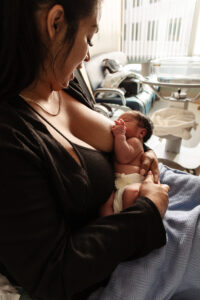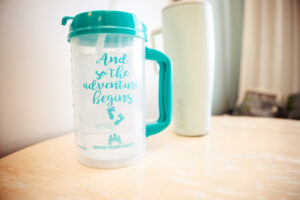
Yay! Baby is here! It’s almost time to go home! WHAT DO WE DO NOW?!
Having a newborn is such a beautiful, exciting new adventure! This stage, though filled with joy, can also be incredibly challenging. Just a heads up ;).
Here’s a roadmap to help you survive the newborn stage with some actionable tips, common pitfalls, and how to handle them.
Physical and Emotional Well-being
1. Sleep (or Lack Thereof)
This is arguably the most difficult aspect of having a newborn. You may hear of some magic babies who sleep through the night early on, but believe me when I say, that is not the norm. So please do not feel like you have something wrong with your baby if you have gone months on end without needing to wake up a few times during the night (some babies even wake every 2 hours…for several weeks!)
Have you ever heard the old adage, “sleep when the baby sleeps”? I’ll be honest, I don’t necessarily agree with this one. If your entire life revolved around feeding, holding, and taking care of a baby, you may just go a little mental. So here is what I recommend…
-Take a shower when baby sleeps. Feed yourself some healthy food when baby sleeps. Clean up the house when baby sleeps. Fold some laundry, call a friend, take a walk and get some fresh air (put baby in the stroller), watch your favorite show, scroll through social media. And yes, take a nap if you feel like everything else that is bugging you is taken care of. It’s A-OK to take a nap. Just do something for YOURSELF. And lets be honest, we are still adults and still have life to deal with, so sleeping every time the baby sleeps just isn’t practical. And if you have a toddler or other children, they are going to need your attention as well.
-At night, sleep. Yes, you will get woken up a lot of times to feed the baby, change diapers, and deal with spit-up or anything liquid that may be ejecting from your infant, but sleep in between those times. And EXTEND your time in the bed. Go to bed a couple of hours earlier than usual, OR STAY in bed a couple of hours later. Whatever works for your schedule. That way, if you can CUMULATIVELY get about 6-8 hours of sleep, you are going to feel a million times better.

A mother breastfeeds her baby, almost ready to go home
2. Nutrition and Hydration (Believe it or not, you may forget to eat, even if that’s never been you before!)
You are sitting on the couch, cuddling your new baby and staring at their beautiful features, and before you know it, four hours have gone by. Not even kidding. I have no idea how it happens. I had no idea about this phenomenon, so I’m really grateful all the sweet ladies from church would bring food over by the bucketloads. We would run to the fridge and grab food and warm it up, and I swear, that saved us!!
It’s so important to fuel yourself with nutritious snacks and stay hydrated, particularly if breastfeeding. If you don’t have a gaggle of cute old ladies bringing food over to you, I highly recommend pre-cooking several meals and freezing them, OR asking for grub-hub gift certificates for your baby shower. Yes, food delivery is going to be a huge relief to you. Just give into it. ha!
I remember when our twins were newborns, I would actually forget to eat (and I am an eater, y’all. I was shocked at how many hours would go without me putting anything in my mouth.) I would get dizzy, feel a little floppy, and suddenly crave a bunch of crap. Forgetting to eat or drink can affect energy levels and milk supply.
So what’s the solution? I recommend preparing easy snacks and keeping a water bottle handy. You may even want to add electrolytes to that water.
Some of the best, most healing and nutritious foods you can eat, include:
- Leafy Greens. You can put them in a smoothie if baby is awake, or make a salad while baby is sleeping. Throw in some canned chicken, chickpeas, or kidney beans to that salad, and it should keep for a few days. I myself love purchasing pre-bagged salad kits and adding protein to them.
- Oats. Oats are not only rich in fiber, iron, and complex carbohydrates, but they can also support milk production and help to keep you full. If you don’t like eating a bowl of oatmeal, grab some oatmeal cookies (try to find low-sugar ones, or make them yourself if you have time). You can also blend dry oats up in a blender and viola, you have flour that you can use for pancakes or whatever else you want to make with it. You can also use oat MILK (yes! they sell it at the grocery store. We get ours at Costco.) in your smoothies or to drink. I bet it makes some mean chocolate milk…just saying….(maybe you can find some chocolate protein powder and mix it in, eh??)
- Eggs. Eggs are high in protein, choline, and healthy fats for brain health and for sustained energy. And who doesn’t need sustained energy when you are taking care of a baby (and possibly other children as well!)
- Salmon. Salmon is rich n omega-3 fatty acids (DHA), which is good for baby’s brain development and helps with, surprisingly, postpartum mood support. If you don’t want to take the time to cook it, order out ;). No shame in ordering take-out, especially if its good for your health and saves you some time!
- Nuts and seeds. Almonds, chia seeds, walnuts, flax, etc, all offer protein, healthy fats, and minerals that are important for your body, like magnesium (helps with leg cramps and sleep) and calcium.
- Greek Yogurt: I know, its gross. But hear me out…you dont have to get the plain kind. If you like that, go for it. But if you can’t stand it, grab a flavored one. Yes, it has more sugar, but at least you are getting good nutrients from it. Greek Yogurt is high in protein, probiotics, and calcium, which can help in digestion and support bone health.
- Lentils and Beans: I’m a big fan of lentil soup. They sell it in cans at the grocery store, its delicious and easy, and full of nutrients. And beans, of course, are also a win. You can get protein, iron, and fiber from lentils and beans, all of which help with energy levels.
- Sweet Potatoes: These are high in beta-carotine, fiber, and vitamin C, great for energy and immune support. You can throw one in the microwave for a few minutes, open it up, and cover it in some amazing chili (if you can find an easy low-fat recipe to make at home, even better.). Costco actually sells pre-cooked sweet potatoes in a bag. So, yes, you are welcome 😉
- Berries: These little gems are full of antioxidants and vitamin C, which supports healing and immunity. Who doesn’t need some extra healing after having a baby? Even if you didn’t give birth, your cells are working extra hard around the clock, because you are probably low in sleep and possibly experiencing anxiety. And when that happens, our immune systems go haywire. So having extra immune support is always a win.
- Lean Meats: Lamb, poultry, beef can provide protein, iron, and zinc, which are essential for tissue repair and energy.
- Avocado: This is a great source of healthy fat and fiber, which can help support satiety, skin health, and energy.
Liquids that both support hydration and Milk Production:
- Water (8-10 cups a day)
- Herbal Teas. Chamomile and rooibos are gentle options. Fenugreek tea can support milk production.
- Bone Broth: This is rich in collagen, amino acids, and minerals. It helps with healing and hydration.
- Coconut Water: This has natural electrolytes for hydration. I don’t like the taste of it, personally, but it makes a mean base for a smoothie. Definitely recommend it.
- Smoothies: Speaking of, this is a great way to throw in some of those foods that will serve you best. Leafy greens, fruits, and greek yogurt can give you a nutrient-packed, hydrating option.
- Milk or Fortified Plant Milks. These will give you some extra calcium and vitamin D.
- Lactation Teas: Look for teas with fennel, anise, and blessed thistle, known to also support milk supply. You may want to check with your doctor or lactation consultant before you introduce a particular tea, just to make sure the ingredients are safe for your baby.

Curious little cuties
3. Emotional Well-being:
You know what? The newborn stage is HARD. It’s normal to have a whole range of emotions. You may look at your baby one minute and be totally in love, and then question everything the next. You may miss life without a baby, and that’s ok, too. Acknowledge and accept your feelings. It’s normal to feel overwhelmed. It doesn’t make you a bad person or a bad parent.
If you are feeling overwhelmed, its also OK to look for support, especially the kind of support that allows you to get some sleep back into your routine. Do you have a neighbor, friend, or relative that you can trust to come over and either help you with household tasks, or give you a few hours of sleep while they take care of your baby? I can remember being so exhausted after a couple of weeks with the twins (they were awake every 2 hours all night and needed food, diaper changes, and cuddles). I actually ended up with some pretty rough diarrhea, the shakes, and a bit of paranoia. I was on edge, incredibly anxious, and physically ill. Thankfully, my mom stepped in. I was terrified she would not wake up if the babies cried, and I still don’t know to this day whether or not she actually heard them (she told me they only woke up a couple of times, so I’m skeptical, honestly), but guess what? I felt a million times better after a couple of nights of sleep, and THEY WERE FINE. And they got time with grandma. YOU HAVE TO SLEEP. Lack of sleep can lead to PPD, and even if you didn’t give birth, this is still a possibility. YEP! It’s not just post-partum-hormone based.
It’s also good to join parent groups. Find friends that also have newborns, or who have recently gotten through this stage. Join mom groups online, even if you never attend the events. Reach out, even if its anonymously, and share your feelings. You are NOT alone in this, and it can make a world of difference to talk to someone. <3.

Seeing Baby for the First Time
Baby Care
1. Understanding their cues.
Eventually, you will understand your baby’s cues. You will learn their cues for hunger, sleep, and comfort. This comes with time. Be patient with yourself. Try different things, and don’t worry, it will come! If baby is crying, they are either tired, hungry, wet/poopy, uncomfortable in their clothes, hot/cold, in pain somewhere, or just want some cuddles. It may be something else, also, but those are the main ones!
Misinterpreting cries can lead to frustration. And you probably will. Did you know there is a hormone that our brains release when we hear a baby cry? It makes us go into frantic mode to figure out what is going on. Try to take a breath, wear headphones if you need to, and figure out what baby wants. This will take some trial and error. You can try feeding them, changing their diaper, or try some soothing techniques, like swaddling, shushing, or swaying.
2. Safe Sleep Practices:
Always place the baby on their back for sleep in a crib without loose bedding. You can wrap them in a swaddle if they prefer that (a LOT of newborns love this!), put on a “shhh-shhh” machine to mimic the womb sounds, and if they are hungry, sit them up at an angle to feed. Feeding them while laying down flat can make it harder for them to swallow safely, and can also lead to more ear-infections.
And while it is rare, SIDS does happen. Adhering to unsafe sleeping arrangements can increase the risk of SIDS.
Before you bring baby home, educate yourself on safe sleep guidelines and set up a safe sleep environment.
3. Bathing and Hygiene:
Baby doesn’t actually need a bath right away. All that beautiful vernix helps to keep their skin moisturized and acts as a barrier to help prevent infection from getting through. But obviously, babies are a bit messy, so eventually, they are going to need a bath. A sponge bath is sufficient until the umbilical cord stump falls off. Bathing too frequently can dry out a newborn’s sensitive skin. Because of this, I recommend using mild, hypoallergenic products and keep bath time quick and gentle.

Relationship Goals
Parenting Relationship
1. Communication with Partner:
If you are breast or chest-feeding, your partner probably feels a little bit like they may not know what to do. It’s good to discuss parenting responsibilities and strategies for sharing duties. Because one partner may be carrying the load with the baby, its important to discuss, together, how you can both share the load. Your partner can change diapers, make bottles, change baby’s clothing, keep your snack tray full, refill your water bottle, make healthy meals, clean up around the house, restock diapers/wipes, watch other children at night or in the morning so you can get enough sleep, and whatever else needs to get done. Decide between the two of you what you feel better about. If the tasks feel like they are unequally distributed, one of you may feel resentful. I recommend making a list of all the duties, and deciding together what everyone is going to do, and what you are going to bless and release. Check in with each other, and adjust as necessary.
2. Seeking and Accepting Help:
You may get a lot of people offering to help, and they may not exactly know what to do. Some people may walk a wide birth around you, wanting to give you space and not overstep during this precious time. But believe me when I say, there are absolutely people in your circle who are so excited and LOVE helping out. Don’t hesitate to ask for or accept help from family and friends.
If you try to do everything yourself, this can lead to physical, mental, and emotional exhaustion. There is a reason they say, “it takes a village to raise a child”.
One thing you can do is to create a schedule to include time for both of you, and let others assist in any way possible, such as delivering meals, cleaning, or babysitting. I know it can feel really weird asking people for help, but if you are feeling overwhelmed and are breaking down, its going to be really hard for you to take care of that baby, who is completely dependent on you for survival.

And so the adventure begins…
Practical Considerations
1. Time Management:
If you are a task-oriented person, you may find that its a little difficult to get even the simplest things done when you have a newborn. In order to not burn yourself out, it may be time to accept the fact that some of those tasks may need to go on the back burner for a little bit. Prioritize tasks, and be flexible with your schedule. Can those dishes wait? Do you HAVE to get your workout done at 530am? I know SOME things are absolute necessities, but weighing everything out and prioritizing what is absolutely the most important (and oftentimes, this does mean making sure your sleep and nutrition needs are taken care of) is going to save you a lot of the mental load, burnout, and guilt-trip you may feel if you aren’t able to get everything done that you were hoping to get done.
Overcommitting to activities, tasks, or visits can be stressful. People do not need to come over if you aren’t ready for it. You do not need to trek out into the wild so that everyone in your family can meet your baby (unless you are ready for it and wanting to!) Keep commitments minimal and allow for spontaneous schedule shifts. It’s okay to say “no.”
2. Simplifying Tasks:
Gone are the days where you can spend extra time doing those tasks you love. I’m sorry. But please remember this is a temporary time. Instead, use batch cooking, diaper delivery services, or online grocery shopping to streamline tasks. The pitfall of not finding ways to streamline is that you may feel overwhelmed by daily chores can detract from bonding with your baby. To avoid this, simplify and delegate tasks where possible to focus on bonding with your newborn.
Self-care and Growth
1. Personal Time:
Wait, what? Personal time when you have a newborn? It might sound crazy, and completely impossible, but try to find ways to schedule daily moments just for you, even if it’s a 10-minute walk or reading. Remember, neglecting yourself can erode mental health over time. And this can affect everything. Treat self-care as non-negotiable to replenish your reserves, because you are going to need those reserves at 3AM when the baby is crying and you are deliriously trying to figure out what is going on while also keeping your cool so that you don’t throw baby out the window (just kidding…..but let’s be honest, maybe you have had that thought once or twice…ok no, is it just me??)
2. Learning and Adapting:
Reading books or articles on parenting can help, but trust your instincts. And for the love, please stay away from guilt-tripping reels on Instagram and TikTok. You have a little human in your arms, a human that you know better than everyone else. If you have concerns or questions, Google can be your best friend, but also feel free to make a doctor’s appointment or call an advice nurse. Over-researching can also lead to information overload. It’s good to balance gaining knowledge with intuition. I can’t even remember how many times we were at the doctor’s office, freaking out about something, only to find out that it was completely normal. But had we not done that, we would have been sitting at home worrying. Not everything will work exactly as per the books, and that is OK! That is why I say try to sift through the information and figure out what seems to ring true for you.
Final Words
Remember, the newborn phase is temporary, and every parent finds their groove at their own pace. Be kind to yourself, celebrate small victories, and cherish these fleeting moments. You’re doing an incredible job!
If you are looking for a postpartum doula to help support you during this newborn phase, please feel free to check out my comprehensive list of local providers in the Modesto area by signing up HERE.
If you are looking for postpartum doula support, feel free to send me a message HERE.
